#Norman Newell
Explore tagged Tumblr posts
Text

The Melbourne Pops Orchestra Conducted By Tweed Harris – To The Door Of The Sun - T.C.S. rec. - 1976 (cover concept by John Reszka)
#witches#orchestras#occult#vintage#tweed harris#the melbourne pops orchestra#melbourne#pops orchestra#orchestra#t.c.s. records#vinyl#lp#john reszka#1976#conti pilat pace panzeri#norman newell
15 notes
·
View notes
Text
1966 - a year of four LPs
1966 was a good year for Russ. He was on the way to recovering as best he could from a stroke he had suffered in late-1965, and by the end of the year he recovered enough that he was able to record four whole albums. This post details those four LPs.
Russ Hour Russ Hour was the first Russ LP to be released in 1966. Recorded on 26th January that year, and released in June, it featured the standard accompaniment directed by Geoff Love.
Unusually, this album was one of two full LPs to be produced from a single recording session held on that day in January. Russ's recording manager, Norman Newell, had booked twice the usual amount of studio time for Russ's first recording session after his stroke as a result of not wishing to overwork him. The first LP they set about recording was Time to Play, which would be released on EMI's budget label Music For Pleasure.
However, because the recording for that LP went so well, the artists moved onto recording a second record - and it was this which became Russ Hour, a full-price LP on EMI's Columbia label. Tracks on this one include Red Roses for a Blue Lady, Lullaby of Broadway, and Hello, Dolly!
Time to Play This was the first record Russ recorded following his 1965 stroke, and was a re-recording of several tunes he had made successful recordings of during the first few years of his solo career. All of the tracks from his 1959 EP Another Six were re-recorded, as well as The Westminster Waltz, The Birthday Cakewalk, Snow Coach, Trampolina, and Matador from Trinidad.
The accompaniment was again directed by Geoff Love (the last time he would work with Russ for an LP), and the album - as was standard for all of Russ's records of this time - made use of the Steinway Model K 'Vertegrand' upright piano which was kept in Abbey Road's Studio Two. This album was released on 16th September 1966. Despite being recorded in stereo, it was initially released in mono only - the same as the Another Six EP.
On compilation albums released after this point, the Time to Play versions of these tunes are almost always the ones included, rather than the original recordings. The most notable difference between the 1966 and original versions is the piano: in 1966, the piano Russ used was much more metallic-sounding than the original Hohner he used at the start of his career.
Concerto for Memories Released some six years after the first of his 'Concerto' albums, this LP marked a significant point in Russ's career: it marked the last time he recorded a new orchestral LP. Released in November 1966 under EMI's Studio2Stereo brand and on their Columbia label, it proved made use of Brian Fahey and his Orchestra.
The title track for this LP was, as with his previous three 'Concerto' albums, written by Russ himself, under his real name of Trevor Herbert Stanford. Concerto for Memories was the only of the four he wrote not to have been released in sheet music form.
This record also marked an interesting turning point for Russ's records: until this point, all of his records had been released either in mono only, or in mono first and then stereo later. However, in this case, it was the stereo mix which was released first, with the mono mix not being released until May 1967. All of Russ's records after this point, except compilation albums using older material, would be released in stereo only.
Pop-a-Conway This last 'pop' album from Russ was released for Christmas 1966, and featured accompaniment directed by Norman Percival rather than Geoff Love. It was the last of his new studio albums to be released by EMI in the UK.
The sleeve notes for this album were written by Hank Marvin, and the tracks included are a range of pop songs from the time, including The Beatles' All My Loving. The More I See You is also included, this time in an upbeat form - it was previously included, in an orchestral style, on Concerto for Memories. Other tracks on this album include Spanish Flea, Strangers in the Night, and It's Not Unusual.
The cover art for this album is bright and colourful, with large title text across it. It's a departure from the standars photograph-and-text for Russ's albums, but a welcome one as it really 'pops' (which works with the album's name, of course!).
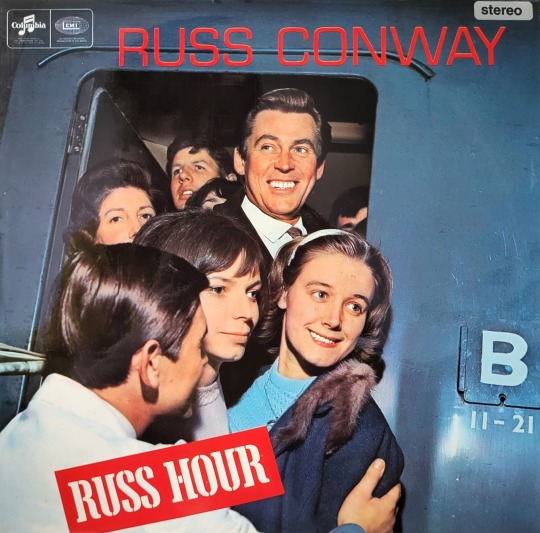

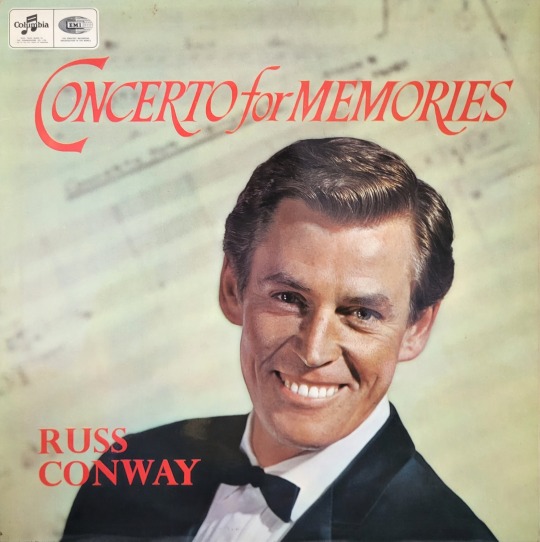
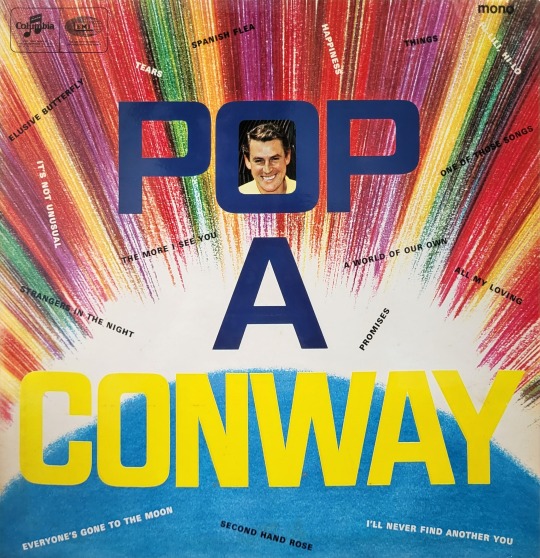
#Russ Conway#Norman Newell#EMI#Columbia#Pianist#Orchestral#Lullaby of Broadway#The Beatles#Abbey Road#Hank Marvin#Vinyl
2 notes
·
View notes
Text
youtube
On July 17th 2009 the singer/songwriter Gordon Waller and one half of the duo Peter & Gordon passed away.
Waller, the son of a surgeon, was born in Braemar, and went to Westminster school, in London, where he met Peter Asher in 1959. Asher was already something of a jazz and blues fan, but Waller persuaded him to broaden his horizons to include pop and rock'n'roll. Both were keen guitarists and soon they were entertaining their fellow students. By 1963, they were playing (initially as Gordon and Peter) in pubs and small clubs at lunchtimes and evenings for small fees or for a meal, often singing their own compositions in the close harmony style of the Everly Brothers. Early in 1964, they were booked for a two-week engagement at the Pickwick nightclub. One of the diners was Norman Newell, an EMI record producer. Newell was charmed enough by Peter and Gordon's rendition of their song If I Were You to offer them a recording contract.
At this time, McCartney was dating Jane, and Peter and Gordon badgered McCartney to provide them with a song. He obliged with A World Without Love, which he had written six years earlier in Liverpool. McCartney told his biographer Barry Miles: "Gordon was a lot of fun – he was slightly less academic than Peter. It was he who persuaded Peter to jump school to do lunchtime sessions."
By the end of March 1964, A World Without Love had displaced the Beatles' own Can't Buy Me Love at the top of the charts. In May, just before Waller's 19th birthday and Asher's 20th, it was the biggest selling record in the US. The instant stardom created by A World Without Love was the beginning of two years of frantic activity for Peter and Gordon.
For the American media, they combined the cachet of a Beatles connection (McCartney wrote several more of their hits and fans discerned in Waller a slight resemblance to John Lennon) There were numerous television appearances, occasional tours of Japan and Australia as well as North America and dozens of recordings. In the next 12 months, Nobody I Know and I Don't Want to See You Again (both by McCartney) were transatlantic hits, as were I Go To Pieces, written by Del Shannon, and True Love Ways, a Buddy Holly song the duo had performed in their early days in London.
By now, Peter and Gordon were competing in North America with numerous other British imports, including another middle-class duo, Chad and Jeremy. Their star began to wane in 1966, when their only hits were Woman, another McCartney composition credited pseudonymously to "Bernard Webb", and Lady Godiva, a novelty number that was denounced as obscene by the mayor of Coventry, which helped it reach the Top 20 in Britain and the American Top 10. By 1967, Peter and Gordon's British career was over and in America they were reduced to peddling olde English material such as the minor hit The Knight in Rusty Armour and the album Sunday for Tea. They split up the next year, with Asher joining the Beatles' Apple project as an A&R man and Waller launching a career as a solo singer.
Despite the fact that he had been the stronger vocalist of the pair, this career was stillborn. A handful of singles were issued, plus a 1970 album of his own compositions called Gordon. He left showbusiness to run a landscape gardening business in Northamptonshire until, in 1971, he took the part of Pharaoh in Joseph and the Amazing Technicolor Dreamcoat, the musical by Andrew Lloyd Webber and Tim Rice.
In the 1980s and 90s Waller ran a music publishing business in America. In the last few years of his life, he reunited with Asher to play a few shows in Los Angeles, the Philippines and New York
12 notes
·
View notes
Text
Newell Convers Wyeth - Breaking the Log Jam [1943]

Newell Convers Wyeth established himself as one of the preeminent illustrators of the early 20th century by successfully fulfilling countless assignments for America’s publishers. Possessing an incontestable knack for the profession, Wyeth’s illustrations were warmly embraced by the American public. While Wyeth established his reputation with his works of the American West and notable story illustrations, he further cemented his legacy, much like Norman Rockwell, with war-linked imagery.
2 notes
·
View notes
Text
Shakespeare in Love at The Maverick Theater
Fullerton, Calif.— The Maverick Theater begins its 2025 season with the stage adaptation of the Academy Award winning Best Picture “Shakespeare in Love”, directed by Brian Newell. Adapted to the stage by Lee Hall from the screenplay by Marc Norman and Tom Stoppard. “Shakespeare in Love” delivers a delightfully crowd-pleasing, deeply romantic, and highly adventurous tale of love and drama in…
0 notes
Text
Décembre MMXXIV
Films
Le Sourire de Mona Lisa (Mona Lisa Smile) (2003) de Mike Newell avec Julia Roberts, Kirsten Dunst, Julia Stiles, Maggie Gyllenhaal, Ginnifer Goodwin, Dominic West, Juliet Stevenson, Marcia Gay Harden et John Slattery
Le Corbeau (1943) de Henri-Georges Clouzot avec Pierre Fresnay, Ginette Leclerc, Pierre Larquey, Micheline Francey, Héléna Manson, Noël Roquevert, Liliane Maigné et Pierre Bertin
Conversation secrète (The Conversation) (1974) de Francis Ford Coppola avec Gene Hackman, John Cazale, Allen Garfield, Frederic Forrest, Cindy Williams, Michael Higgins et Elizabeth MacRae
La Cuisine des anges (We're No Angels) (1955) de Michael Curtiz avec Humphrey Bogart, Peter Ustinov, Aldo Ray, Joan Bennett, Basil Rathbone, Leo G. Carroll et Gloria Talbott
Le Fils du Français (1999) de Gérard Lauzier avec Josiane Balasko, Fanny Ardant, Thierry Frémont, David-Alexandre Parquier, Florian Robin, Luca Barbareschi, George Aguilar et Fanny Valette
Ne m'envoyez pas de fleurs (Send Me No Flowers) (1964) de Norman Jewison avec Rock Hudson, Doris Day, Tony Randall, Paul Lynde, Hal March, Edward Andrews et Patricia Barry
Boulevard du rhum (1971) de Robert Enrico avec Lino Ventura, Brigitte Bardot, Bill Travers, Clive Revill, Jess Hahn, Antonio Casas, Andréas Voutsinas, Guy Marchand et Jack Betts
Le Seigneur des Anneaux : La Guerre des Rohirrim (The Lord of the Rings: The War of the Rohirrim) (2024) de Kenji Kamiyama avec Gérard Darier, Marion Gress, Augustin Bonhomme, Barbara Tissier, Vanina Pradier, Daniel Njo Lobé et Cyril Descours
La Main au collet (To Catch a Thief) (1955) d'Alfred Hitchcock avec Cary Grant, Grace Kelly, Jessie Royce Landis, John Williams, Charles Vanel, Brigitte Auber, Jean Martinelli et Georgette Anys
Maman, j'ai raté l'avion ! (Home Alone) (1990) de Chris Columbus avec Macaulay Culkin, Joe Pesci, Daniel Stern, John Heard, Catherine O'Hara, Roberts Blossom, Gerry Bamman et Terrie Snell
Fais pas ci, fais pas ça : On va marcher sur la Lune (2024) de Alexandre Castagnetti avec Valérie Bonneton, Guillaume De Tonquédec, Isabelle Gélinas, Bruno Salomone, Yaniss Lespert, Tiphaine Haas, Canelle Carré-Cassaigne, Timothée Kempen-Hamel, François Vincentelli et Alice Dufour
La Cité disparue (Legend of the Lost) (1957) de Henry Hathaway avec John Wayne, Sophia Loren, Rossano Brazzi, Kurt Kasznar, Sonia Moser et Angela Portaluri
Le Calendrier secret de Noël (Christmas in Evergreen: Tidings of Joy) (2019) de Sean McNamara avec Maggie Lawson, Paul Greene, Rukiya Bernard, Holly Robinson Peete, Barbara Niven, Jill Wagner, Ashley Williams, Patty McCormack et Colin Lawrence
Serenity (2005) de Joss Whedon avec Nathan Fillion, Gina Torres, Alan Tudyk, Sean Maher, Summer Glau, Morena Baccarin, Adam Baldwin, Jewel Staite, Ron Glass et Chiwetel Ejiofor
Les Aventures d'Arsène Lupin (1957) de Jacques Becker avec Robert Lamoureux, Otto E. Hasse, Liselotte Pulver, Paul Muller, Daniel Ceccaldi, Huguette Hue, Georges Chamarat, Renaud Mary et Henri Rollan
Love Actually (2003) de Richard Curtis avec Hugh Grant, Liam Neeson, Emma Thompson, Laura Linney, Alan Rickman, Martine McCutcheon, Bill Nighy, Colin Firth, Andrew Lincoln, Keira Knightley, Chiwetel Ejiofor, Rowan Atkinson, Kris Marshall et Martin Freeman
Danger planétaire (The Blob) (1958) de Irvin S. Yeaworth Jr. et Russell S. Doughten Jr. avec Steve McQueen, Aneta Corsaut, Earl Rowe, Olin Howland, Elbert Smith, Hugh Graham, Anthony Franke et George Karas
La vie est belle (It's a Wonderful Life) (1946) de Frank Capra avec James Stewart, Donna Reed, Lionel Barrymore, Thomas Mitchell, Henry Travers, Frank Faylen, Ward Bond et Gloria Grahame
La Dame de Noël (1958) de Marcel Bluwal avec Jean Marc Bory, Nicole Courcel, Roger Coggio, Maurice Chevit et Guy Decomble
Père Noël et Fils (1983) d'André Flédérick avec Jean-Claude Brialy, Dominique Davray, Annie Girardot, Sébastien Privat, Jean-Marie Proslier, Popeck, Yvonne Clech, Hélène Duc, Marthe Villalonga, Hubert Deschamps et Johnny Hallyday
Ulysse (Ulisse) (1954) de Mario Camerini avec Kirk Douglas, Silvana Mangano, Anthony Quinn, Rossana Podestà, Jacques Dumesnil, Sylvie, Daniel Ivernel, Franco Interlenghi, Elena Zareschi et Evi Maltagliati
Maman, j'ai encore raté l'avion ! (Home Alone 2: Lost in New York) (1992) de Chris Columbus avec Macaulay Culkin, Joe Pesci, Daniel Stern, John Heard, Catherine O'Hara, Brenda Fricker, Eddie Bracken, Tim Curry et Rob Schneider
Le Pôle express (The Polar Express) (2004) de Robert Zemeckis avec Maxime Baudouin, Camille Donda, Jean-Philippe Puymartin, Lola Krellenstein, Céline Monsarrat et Laurent Lévy
Anastasia (1956) d'Anatole Litvak avec Ingrid Bergman, Yul Brynner, Akim Tamiroff, Sacha Pitoeff, Helen Hayes, Martita Hunt, Ivan Desny et Felix Aylmer
Dix Petits Nègres (Ten Little Indians) (1974) de Peter Collinson avec Oliver Reed, Elke Sommer, Richard Attenborough, Stephane Audran, Gert Froebe, Herbert Lom, Maria Rohm, Adolfo Celi, Alberto de Mendoza et Charles Aznavour
La Classe américaine : Le Grand Détournement (1993) de Michel Hazanavicius et Dominique Mézerette avec Christine Delaroche, Evelyne Grandjean, Marc Cassot, Patrick Guillemin, Raymond Loyer, Joël Martineau, Jean-Claude Montalban et Roger Rudel
Séries
Columbo Saison 10, 11, 12
Criminologie appliquée - À chacun son heure - Un seul suffira
Les Enquêtes Ceméléon
Une Affaire de famille - Attention à la peinture
Firefly
Serenity - L'Attaque du train - Pilleurs d'épave - Le Duel - Sains et Saufs - La Femme du commandant - De la boue et des hommes - La Panne - Intrusion - Histoires anciennes - Déchet précieux - Le Message - Mission secours - Objet volant identifié
Psych Saison 5, 6, 7
Mort de frousse - Dual Spires - Premiers de la classe - Espèce menacée - Grosse Bêtise - Yin, Suite et Fin - Immunité problématique - Carrément mordus ! - Very Bad nuit - Super héros - Tous au stade - Shawn au-dessus d'un nid de coucou - Complètement babas - Mon père cet escroc - Enfin seuls ! - Indiana Shawn et le Trésor perdu - À mourir de peur - Les Prétendants - À chœur et à cris - Un crime peut en cacher un autre - Juste Cause - Santa Barbara, ton univers impitoyable - Santa Barbara 2, l'arme fatale 5 - Un site de rencontre mortel - Le Projet BigFoot
Friends Saison 5, 6, 7
Celui qui prenait de bonnes résolutions - Celui qui riait différemment - Celui qui avait un sac - Celui qui découvre tout - Celui qui prenait des coups - Celui qui enviait ses amis - Celui qui ne savait pas se repérer - Celui qui se sacrifiait - Celui qui ne savait pas flirter - Celui qui sauvait des vies - Celui qui jouait à la balle - Celui qui devait casser la baraque - Celui qui était à Las Vegas : première partie - Celui qui était à Las Vegas ; deuxième partie - Ceux qui revenaient de Las Vegas - Celui qui console Rachel - Celui qui était de mauvaise foi - Celui qui perdait sa belle assurance - Celui qui avait une belle bagnole - Ceux qui passaient leur dernière nuit - Celui qui avait une jolie colocataire - Celui qui avait les dents blanches - Celui qui s'était drogué - Celui qui souhaitait la bonne année - Celui qui avait le derrière entre deux chaises - Celui qui inventait des histoires - Celui qui sortait avec la sœur - Celui qui ne pouvait pas pleurer - Ce qui aurait pu se passer : première partie - Ce qui aurait pu se passer : deuxième partie - Celui qui avait l'Unagi - Celui qui sortait avec une étudiante - Celui qui avait des problèmes de frigo - Celui qui avait une audition - Celui qui rencontrait le père - Celui qui se la jouait grave - Celui qui achetait la bague - Celui qui faisait sa demande : première partie - Celui qui faisait sa demande : deuxième partie - Celui qui croyait faire jeune - Celui qui réglait le mariage - Celui qui s'était mal assis
Affaires sensibles
Le Corbeau : La légende noire d’Henri-Georges Clouzot - La Bête qui mange le monde : Gévaudan, 1764 - Les enfants otages de Loyada : la France sous pression - Dissolution de 1997 : les coulisses d'un fiasco - Mirapolis, la chute d’un géant - "Sept morts sur ordonnance" : quand la littérature et le cinéma s’emparent d’un fait divers - La présidentielle américaine de 2016 et l’improbable victoire de Donald Trump - Présidentielle 2012 : Hollande l’inattendu - L'aérotrain, l’ex-train du futur - La famille Sackler, les opioïdes et la mort - Charlie Chaplin banni des États-Unis - Un bateau pour le Vietnam : quand la France découvrait les boat-peoples
Astrid et Raphaëlle Saison 2
L'Étourneau - Irezumi - Le Paradoxe de Fermi - Point d'orgue - Circé - Golem - Le Livre - En garde à vue
Cat's Eyes Saison 1
Durrieux - Heinz
Alexandra Ehle Saison 5
Un message pour l'éternité - La femme bleue
Commissaire Dupin
La croix d'Emma
Zorro Saison 1
Episode 1 - Episode 2
Meurtres au paradis
Qui veut tuer le Père Noël
Doctor Who
Joy to the World
Spectacles
Eric Clapton : Live at Montreux (1986) avec Nathan East, Phil Collins et Greg Phillinganes
Michael Bublé : at the BBC (2016)
Kool & the Gang : Live from House of Blues (2001)
Etienne Daho Show (2023)
Stephan Eicher : Eldorado Trio Live (2008)
Claude Nougaro : Embarquement immédiat (2001) au Théâtre des Champs Elysées
Michael Bublé: Home for the Holidays (2012) avec Michael Bublé, Kevin Clash, Carly Rae Jepsen, Blake Shelton et Rod Stewart
Christmas in Rockefeller Center (2011) avec Tony Bennett, Big Time Rush, Michael Bublé, Javier Colon, Neil Diamond, Megan Hilty Megan Hilty, Carole King, Katharine McPhee et The Radio City Rockettes
Cartoons in concert (2022) par le DR Symphony Orchestra
Le professeur Rollin se re-rebiffe (2017)
Raiders of the Symphony (2023) par le DR Symphony Orchestra
Livres
Deux tueurs (suivi de) Mickey Mickey de Michel Pirus, Véronique Dorey et Mezzo
Une enquête du commissaire Dupin : Enquête troublante à Concarneau de Jean-Luc Bannalec
Batman : Amère victoire de Jeph Loeb et Tim Sale
J'ai peur des mouches de Frédéric Dard
Le Spirit : Intégrale, tome 1 de Will Eisner
La vengeance de Zorro de Johnston McCulley
Le Spirit : Intégrale, tome 2 de Will Eisner
Strange N°146
Strange N°171
Captain America, tome 13 : Le Faucon et la Vipère de Steve Englehart, Steve Gerber et Sal Buscema
0 notes
Text
Animation and Design in Team Fortress 2 - Valve Software, 2007
One of the most iconic video games of the 2000's, Team Fortress 2 (TF2 for short) has become famous even outside the bounds of traditional gaming culture. As a multiplayer first person shooter (FPS) in a decade already suffused with games of that ilk, TF2 managed to set itself apart from its competitors through its unique art style, its pronounced sense of humour, and its incredibly memorable "Meet the Team" promotional animated shorts, and has gone on to have a legacy that has lasted almost 20 years after its release, especially in use through Valve's proprietary "Source Filmmaker" software, using the game's models and maps as an endlessly useful toolbox for fans looking to emulate the game's humour. But how did such an off-kilter yet wildly successful game come into being?
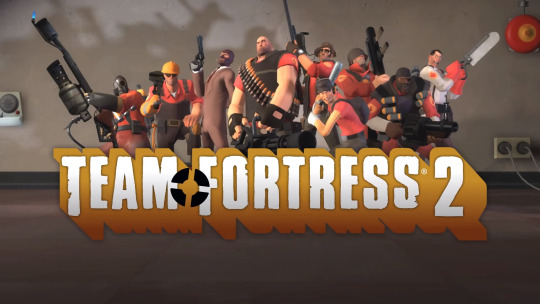
Team Fortress 2's title screen, from later Meet the Team videos.
Although not common knowledge, Team Fortress actually has its roots in a much older game - id Software's seminal release, Quake. Quake was already a massively influential game in terms of how it was rendered as compared to earlier titles like Doom, which utilized a "2.5D" style - having environments that were essentially 3D through use of rendering tricks while still utilizing 2D sprites for its enemies, props, and the player's weapons. Quake featured, in contrast, fully modelled polygonal 3D characters, environments and even viewmodels for weapons. Although they are comparatively primitive when compared to modern graphics, Quake's jump in fidelity from previous titles created a major splash in the industry.

Team Fortress' 9 player classes in the original mod for Quake.
Aside from pushing technical boundaries, id Software titles are also famous for another important facet of their longevity - modding support. Modding, in game terms, is when fans of a game edit the game's code, graphics, even gameplay to dramatically change the experience far beyond the developer's original intentions. The original Team Fortress was one such mod, changing the frenetic yet ultimately self-serving style of Quake's deathmatch-style multiplayer into a class-based, team vs. team objective. Developed by Robin Walker and John Cook, the mod became extremely popular and developed a large number of "clans", organized groups of players who would host servers and fight in competitive matches against one another.

Early promotional screenshots of Team Fortress 2, then subtitled "Brotherhood of Arms", showing one of its first art styles - at this point the game was designed to have a realistic military aesthetic.
In 1998, following the success of their first game, Half-Life, Valve Software, a company founded by Gabe Newell and Mike Harrington, were looking to find their next project after Half-Life's rocky production schedule. Having enjoyed the TF Quake mod themselves, Valve hired Walker and Cook to work on an adaptation of Team Fortress for the Goldsource engine, eventually releasing as Team Fortress Classic. After this, they quickly began working on a sequel, the game that would become Team Fortress 2. However, they could not imagine the challenges that creating TF2 would produce. The game would ultimately take over 9 years to develop, and over the course of that near decade-long development cycle the game would drastically change art style and gameplay goals multiple times, with years of work often being thrown away to keep up with technological changes.

Concept art for the "Heavy Weapons Guy", one of 9 classes in TF2.
Eventually, some time after switching to the Source engine that powered Valve's flagship release Half-Life 2 in 2004, the choice was made to abandon the game's original intended realistic military art style in terms of a much more exaggerated, cartoonish look inspired by the work of early 20th century commercial illustrators such as J. C. Leyendecker, Dean Cornwell, and Norman Rockwell. Textures created for the characters and environments were painted with visible brushstrokes or are based on photos that are edited by hand to appear more stylized. The maps are designed with an "evil genius" theme, featuring archetypical spy fortresses, hidden inside inconspicuous buildings such as industrial warehouses and farms to give plausibility to their close proximities. These bases hide exaggerated super weapons such as laser cannons, nuclear warheads, and missile launch facilities, which serve as the in-game objectives during matches.

TF2's 9 classes and their silhouettes.
One of the most important factors of TF2's artistic success is its intent towards readability during the chaotic fracas of player-vs-player gameplay. Their colour schemes, while primarily used to help distinguish between each team (RED and BLU), also uses contrast on the character's model to help draw the player's eye towards the model's chest, where the weapon is held - quickly allowing a player to determine what kind of threat an enemy might pose. Each of the 9 playable classes were designed to be immediately recognizable at any range, mostly through their distinct silhouettes and use of animation. This also allowed each class to develop its own distinct personality - a Soldier will lumber about with his bulky rocket launcher, while a Spy lurks in the shadows with his deadly backstabbing butterfly knife.

Screenshot from "Meet the Heavy", first of the promotional "Meet the Team" videos.
This strong emphasis on personality, though originally a gameplay mechanic, ultimately proved to be one of TF2's strongest thematic elements as well, leading to the creation of the "Meet the Team" animated shorts. Originally based on the audition scripts used by the actors such as Gary Schwartz, who plays the "Heavy Weapons Guy", the shorts utilized the updated Source engine's new faceposing technology, allowing these stylized character models a broad range of ability to emote. Their personalities are immediately apparent to anyone who watches these brilliant shorts - the Heavy's love for his absurdly giant gun, the Sniper's relaxed professionalism towards his assassinations, the Medic's unhinged joy at being able to toy with human life, these larger-than-life characters are beautifully realized with both broad and subtle touches through design and animation.
youtube
An example of a fan-made Source Filmmaker animation, using an audio clip from Futurama.
The "Meet the Team" videos were an immediate success, portraying the game's unique style on a level that some compared to Pixar Studios' work. Eventually, Valve would release the tool they used to create these animations - Source Filmmaker. Using characters and maps from TF2 and other Source engine games, fans could create their own animations for free, ranging from low-effort shitposts made in a few days for a laugh to full-length professional level features with highly polished animation and custom voicework. The community's skill was such that from 2011 to 2017 Valve ran the "Saxxy Awards", named after the in-game character Saxon Hale. This annual worldwide competition was held for any 3D animation made in SFM, receiving hundreds of submissions at its peak and originally hosting 20 categories for submission, with winners receiving a special limited release in-game weapon as a prize.
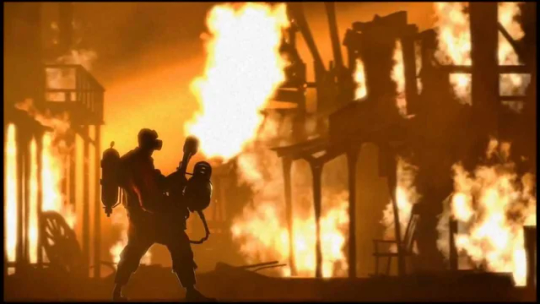
Screenshot from "Meet the Pyro", the final "Meet the Team" short released by Valve.
The SFM community is still strong today, although its aging technology and its association with pornographic depictions of characters from other games like Overwatch have tarnished its reputation somewhat. Despite this, it is hard to overstate how much of an impact Team Fortress 2 has had in the course of its 17 year lifespan. Not only has it influenced my artistic development, I have personally put an unconscionable amount of time in public servers and playing with friends over the years, and while I don't find myself going back to play it nearly as often these days, I am always filled with warm memories of the good times I had whenever I see the character's distinctive, goofy mugs.

Sources:
https://wiki.teamfortress.com/wiki/Team_Fortress_2#Development
https://wiki.teamfortress.com/wiki/Hydro_developer_commentary
https://wiki.teamfortress.com/wiki/Well_developer_commentary
https://wiki.teamfortress.com/wiki/Gravel_Pit_developer_commentary
0 notes
Text
Sherlock Holmes and Dr. Watson meet as boys in an English Boarding school. Holmes is known for his deductive ability even as a youth, amazing his classmates with his abilities. When they discover a plot to murder a series of British business men by an Egyptian cult, they move to stop it. Credits: TheMovieDb. Film Cast: Sherlock Holmes: Nicholas Rowe John Watson: Alan Cox Elizabeth Hardy: Sophie Ward Professor Rathe: Anthony Higgins Mrs. Dribb: Susan Fleetwood Det. Sgt. Lestrade: Roger Ashton-Griffiths Dudley’s Friend: Matthew Ryan Dudley: Earl Rhodes Chester Cragwitch: Freddie Jones Bentley Booster: Patrick Newell Khasek – Lower Nile Tavern Owner: Nadim Sawalha Rupert T. Waxflatter: Nigel Stock Master Snelgrove: Brian Oulton The Reverend Duncan Nesbitt: Donald Eccles Dudley’s Friend: Matthew Blakstad Dudley’s Friend: Jonathan Lacey Ethan Engel: Walter Sparrow Mr. Holmes: Roger Brierley Mrs. Holmes: Vivienne Chandler Curio Shop Owner: Lockwood West Cemetery Caretaker: John Scott Martin School Porter: George Malpas School Reverend: Willoughby Goddard Policeman with Lestrade: Michael Cule Policeman in Shop Window: Ralph Tabakin Hotel Receptionist: Nancy Nevinson Older Watson (voice): Michael Hordern Schoolboy (uncredited): Grant Burns Acolyte (uncredited): George Lane Cooper Chestnut Seller (uncredited): Salo Gardner Restaurant Patron (uncredited): Lew Hooper Footman (uncredited): Royston Munt School Master (uncredited): Henry Roberts Patron (Lower Nile Tavern) (uncredited): Fred Wood Film Crew: Animation: John Lasseter Casting: Irene Lamb Executive Producer: Steven Spielberg Executive Producer: Kathleen Kennedy Executive Producer: Frank Marshall Production Design: Norman Reynolds Visual Effects Supervisor: Dennis Muren Producer: Roger Birnbaum Director: Barry Levinson Producer: Mark Johnson Editor: Stu Linder Director of Photography: Stephen Goldblatt Animation: Eben Ostby Animation: Don Conway Animation: David DiFrancesco Set Decoration: Michael Ford Screenplay: Chris Columbus Makeup Artist: Nick Dudman Art Direction: Fred Hole Makeup Supervisor: Peter Robb-King Art Direction: Charles Bishop Assistant Art Director: Gavin Bocquet Original Music Composer: Bruce Broughton Associate Producer: Harry Benn Characters: Arthur Conan Doyle Costume Design: Raymond Hughes Producer: Henry Winkler Visual Effects Supervisor: David Allen Animation: Craig Good Second Unit Director: Andrew Grieve Visual Effects: Robert Cooper Assistant Art Director: George Djurkovic Third Assistant Director: Peter Heslop Visual Effects Camera: Jay Riddle Visual Effects: Blair Clark First Assistant Director: Michael Murray Animation Supervisor: Bruce Walters Art Direction: Dave Carson Visual Effects: Sean M. Casey Second Assistant Director: Ian Hickinbotham Makeup Artist: Jane Royle Animation: William Reeves Visual Effects: Tony Hudson Visual Effects: Jay Davis Animation: Barbara Brennan Animation: David Salesin Animation Supervisor: Ellen Lichtwardt Goodchild Dressing Prop: Paul Cheesman Art Designer: Michael Ploog Draughtsman: Reg Bream Rotoscoping Artist: Donna K. Baker Draughtsman: Peter Childs Animation: Robert L. Cook Animation: Gordon Baker Animation: Jack Mongovan Visual Effects: Tony Laudati Visual Effects: Marghi McMahon Movie Reviews:
#aftercreditsstinger#england#london#murder#religion and supernatural#school friend#sherlock holmes#Top Rated Movies
0 notes
Text
For instance, Norman E. Gibbs and Allen. B. Tucker first defined the field of computer science as the study of algorithms, including their formal and mathematical properties hardware realization, linguistic structures, and applications. In contrast, early computer scientists Allen Newell and Herbert A. Simon see computer science as an empirical discipline, or more specifically, a living machine that extends beyond the experimental sciences. Byung-Chul Han. 2022. Non-things: Upheaval in the Lifeworld. Cambridge: Polity Press.
0 notes
Text
THE 100 GREATEST DIRECTORS IN THE HISTORY OF WORLD CINEMA! (@INDIES)
.Roman Polanski
.David Lean
.Alfred Hitchcock
.Frank Capra
.Elia Kazan
.Dasari Narayana Rao
.Fred Zinnemann
.Milos Forman
.Kamal Amrohi
.Peter Jackson
.John Huston
.Billy Wilder
.Frank Lloyd
.Roland Joffe
.Lekh Tandon
.Asit Sen
.B.R. Chopra
.Edgar Wright
.Chris Columbus
.Ernst Lubitsch
.Alain Resnais
.Guru Dutt
.George Cukor
.Ivan Reitman
.Mahesh Kaul
.Jayant Desai
.Richard Curtis
.Robert Clouse
.Basu Bhattacharya
.Maurice Pialat
.David MacDonald
.Mel Gibson
.Anthony Minghella
.Jamie Uys
.Joseph Mankiewicz
.Pierre Chenal
.David Fincher
.Ken McMullen
.Jeremy Leven
.Mary McGuckian
.Alfonso Cuaron
.Rob Reiner
.Delbert Mann
.Louis Malle
.John Cromwell
.Charles Chaplin
.A. Bhimsingh
.Jean Delannoy
.Mervyn LeRoy
.Nancy Meyers
.William Wyler
.Bhargava (Kannada)
.Jonathan Lynn
.Peter Weir
.Robert Rossen
.Roger Michell
.Robert Zemeckis
.Robert Z. Leonard
.J. Lee Thompson
.Robert Wise
.Jerome Hill
.Anthony Quinn
.Jacques Audiard
.Agnes Jaoui
.Mervyn LeRoy
.Roland Emmerich
.Wallace Worsley
.Stephen Herek
.Blake Edwards
.Andrew Fleming
.John Frankenheimer
.Claude Autant-Lara
.Kenneth Branagh
.Lasse Halstrom
.Ralph Nelson
.Andrei Tarkovsky
.Robert Stevenson
.John Madden
.Stanley Kramer
.Olivier Dahan
.Norman Z. McLeod
.Mike Newell
.Raymond Rouleau
.Michael Curtiz
.Nora Ephron
.Arthur Hiller
.Vittorio De Sica
.Bernardo Bertolucci
.Sohrab Modi
.John McTiernan
.Steven Spielberg
.Tay Garnett
.Abel Gance
.Richard Linklater
.Merian C. Cooper
.Michael Bay
.Renny Harlin
.Victor Fleming
.Phil Karlson
.Satyajit Ray
.David Yates
.John Guillermin
.Oliver Stone
.James Cameron
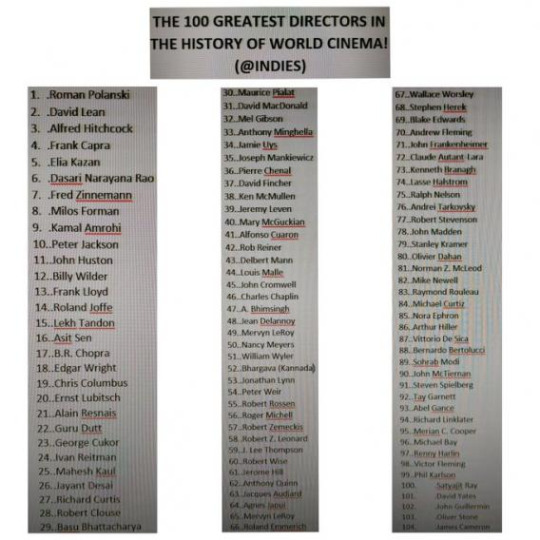

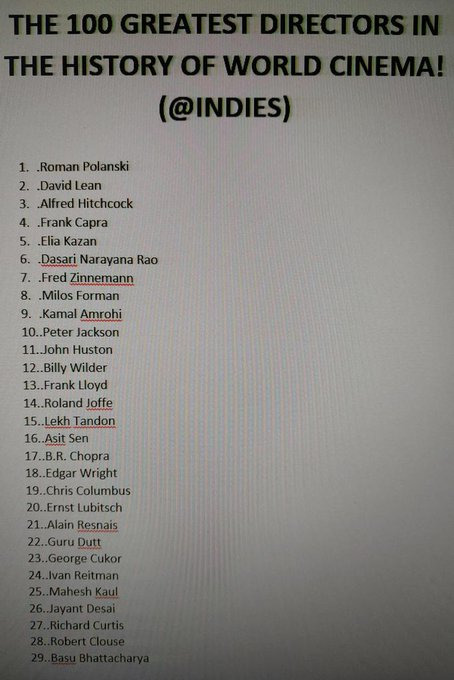


1 note
·
View note
Text
The Slatest Jun 7: Wow, Jack Smith Has Been Busy Lately!
It’s more fun via email (promise). This article first appeared in our Slatest evening newsletter, which seeks to surface the best pieces published across Slate’s digital and audio journalism. We publish it there to help you cut to the chase at the end of each day. To get it in your inbox, along with more of the best work we published that day, sign up below.
Special prosecutor Jack Smith seems to be nearing the finish line on his two federal probes into Trump’s alleged misconduct—one looking at his mishandling of classified documents, the other at potential 2020 election interference. And as Smith wraps up, there’s been a whole slew of stories coming out with details on what his team has been looking at in its investigation. Having a hard time keeping track? Shirin Ali has a guide to the latest developments.
Plus: Trump’s response to Alvin Bragg’s indictment tells us something about how he’ll probably respond to other indictments in the future, Norman L. Eisen and Trevor W. Morrison write.
Hope for debt relief?
Later this month, the Supreme Court will issue its decision on whether the Biden administration’s student debt relief program can go forward. But Congress just upended the legal case against relief, Alex Rowell argues.
Plus: To push back against the Supreme Court’s dysfunction, liberals have to realize something that conservatives figured out a long time ago, Michael Waldman says. He spoke to Dahlia Lithwick about the growing need for reform, and how Congress can do something about it.
And speaking of Supreme Court dysfunction: The second episode of Slow Burn looks at how race-based admissions shaped Clarence Thomas.
It’s Christie Time
Chris Christie in 2014. Reuters
Chris Christie is entering the presidential race, and Jim Newell, for one, is glad about it. If nothing else, Christie is going to liven things up around here, probably! He may have joined the race as no more than a Trump-seeking missile, Newell writes, but at least he’s got nothing to lose.
Country cousins
The Trump-era fascination with the politics of rural America just won’t die! Steven Conn reviews a new book that wants to lay the fault for our rural-urban divide at city people’s feet, and finds it “hopelessly muddled.”
Royal circus
The Royal family is freaked out by Prince Harry’s court testimony. Maybe it should be! Heather Schwedel explains why.
An ominous orange haze
Angela Weiss/Getty Images
What should you do if you’re living in part of the Northeast that’s covered with wildfire smoke right now? Writing from the West Coast, Meg Duff has some advice, both practical and emotional, from someone who’s been through this kind of thing before. She recommends air filters, masks, calming tea—and no major life decisions.
Plus: We’ve rounded up some striking images of how bad the sky looked today.
ProbleMATTic
If you’ve been seeing the name “Matt Rife” all over your Twitter timeline and have no idea who that is, you’re not alone. Nadira Goffe has a beginner’s guide to the zillennial comedian whose tour tickets are impossible to get, and whether he is, in fact, “ProbleMATTic.”
A grim merger
Top-tier golf is now permanently in bed with the Saudi government. Alex Kirshner walks us through how it happened.
Today, Slate is… COLLECTING AND ANALYZING DIGITAL DETRITUS*
…much like the federal criminal investigators in James Comey’s first crime novel (and, well, his real life). Read Ankush Khardori’s review to find out how bad it is.
Thanks so much for reading! We’ll see you tomorrow.
0 notes
Text
My Concerto for You - 1960

Russ recorded his first orchestral album, My Concerto for You, in late 1959 and early 1960. It was a distinct departure from the upbeat 'honky-tonk' sound which had made him famous, and although he had recorded an orchestral single before (The World Outside, in 1958), this was something completely new.
Accompanied by Michael Collins and his Concert Orchestra, and the Williams Singers, Russ recorded twelve orchestral tracks, including the title track, which was a self-penned composition which he wrote under his real name of Trevor H. Stanford.
The initial release date was planned to be late 1959, but due to a degree of distortion on some of the initial recordings, a second recording session was planned for early January 1960 and so the album was released that year.
It goes to show just how popular Russ was at this time that such a different album to all the others he'd made managed to reach number five on the UK Album Charts, and remained on the charts for eighteen weeks - longer than any of his other LPs. Norman Newell was initially apprehensive about recording an orchestral LP with Russ, but it had proved to be a big success.
It led to a further five orchestral albums from Russ: At the Theatre, At the Cinema, and three others in the 'Concerto' series - Concerto for Dreamers, Concerto for Lovers, and Concerto for Memories. All of these 'Concerto' albums had their title tracks composed by Russ, and he would later say that Concerto for Memories was his favourite composition of all those he had made during his career.
An interesting note about the piece entitled My Concerto for You is that it was given the subtitle Theme from the Bristol Concerto for its sheet music release: in his Desert Island Discs radio appearance, Russ said it was his intention to take My Concerto for You and work it into a full-scale concerto. Unfortunately, this never happened, but his sheer talent as a composer can be seen in the concertos he did produce.
0 notes
Text
youtube
"I Hate You Then I Love You" by Luciano Pavarotti & Celine Dion
I'd like to run away from you But if I were to leave you I would die I'd like to break the chains you put around me And yet I'll never try
No matter what you do you drive me crazy I'd rather be alone But then I know my life would be so empty As soon as you have gone Impossible to live with you But I could never live without you For whatever you do For whatever you do
I never, never, never Want to be in love with anyone but you
You make me sad You make me strong You make me mad You make me long for you You make me long for you
You make me live You make me die You make me laugh You make me cry for you You make me cry for you
I hate you Then I love you Then I love you Then I hate you Then I love you, I love you more For whatever you do I never, never, never Want to be in love with anyone but you
You treat me wrong You treat me right You let me be You make me fight with you I could never live without you
You make me high You bring me down You set me free You hold me bound to you
I hate you Then I love you Then I love you Then I hate you Then I love you more For whatever you do Whatever you do
I never, never, never Want to be in love with anyone but you I never, never, never I never, never, never I never, never, never Want to be in love with anyone but you But you
"I Hate You Then I Love You" is a song sung as a duet between Celine Dion and Luciano Pavarotti. It was first released as a track on Celine Dion's 1997 album Let's Talk About Love.
The song was written by Alberto Testa, Tony Renis and Norman Newell. Luciano Pavarotti unexpectedly teamed up with Celine Dion to sing one of her biggest hits. Pavarotti was one of the most successful opera singers in history and enjoyed a career of more than 50 years.
Producers David Foster, Humberto Gatica & Tony Renis
0 notes
Text
Born To Sing Forever
Born To Singalso entitledI Was Born To Sing ForeverWritten by M. Jouveaux / J.BarnelEnglish words penned by Norman Newell. Released in 1986 as B-side of a Towerbell single (A-side: There’s No Place Like London). The recording has never been re-released, but Shirley Bassey has performed the song on some live concerts 1995 on her 40th anniversary world tour. The original French title of this song…

View On WordPress
0 notes
Audio

Annie Bright - Stand Up and Be Counted (Columbia)
wrt. Alan Hawkshaw and John Cameron & prod. Alan Lockey and Norman Newell, 1970.
#Annie Bright#Stand Up and Be Counted#alan hawkshaw#alan lockey#john cameron#norman newell#producer#1970#funk#soul#easy listening
7 notes
·
View notes